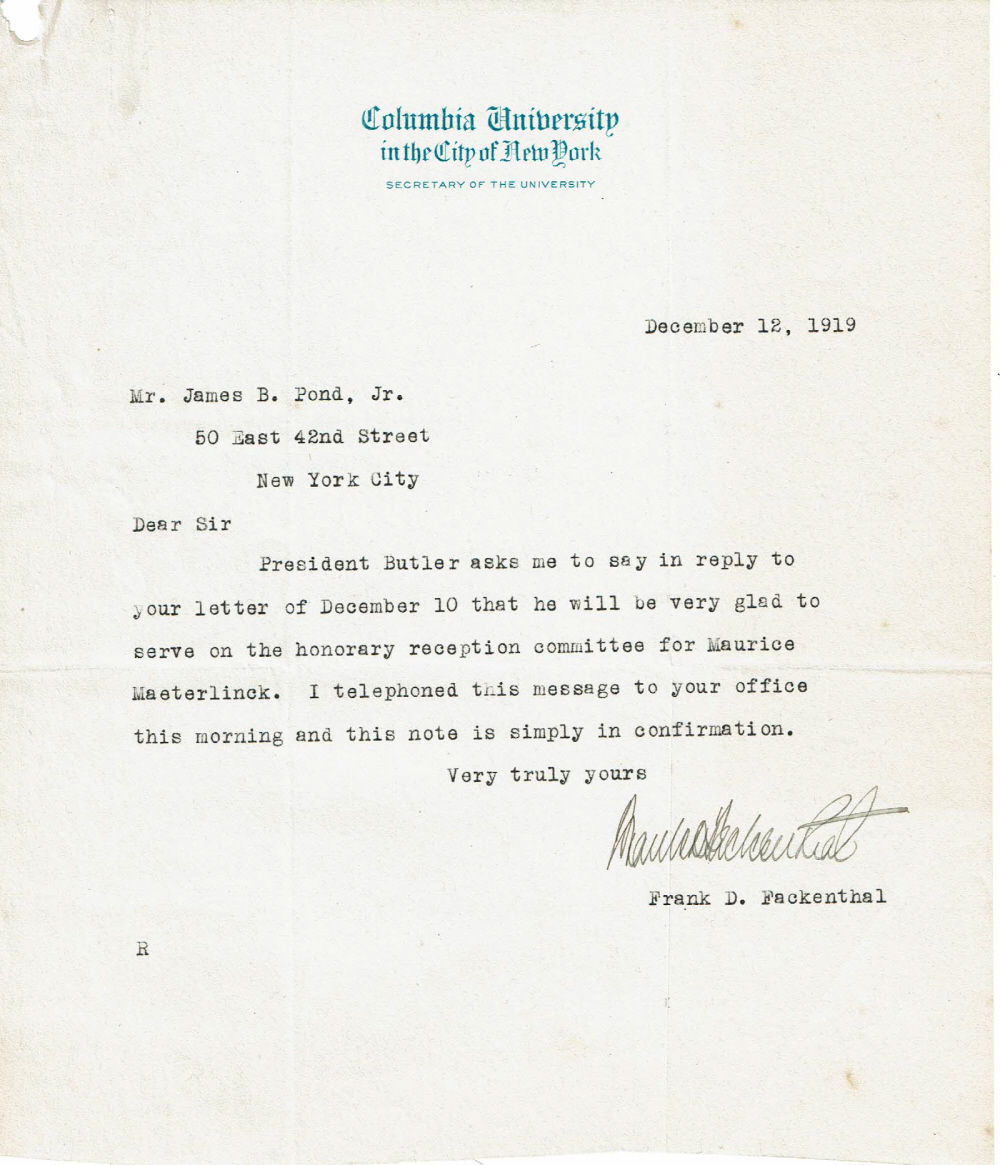
Title: Typed Letter Signed by Columbia University's Secretary Frank D. Fackenthal, the de Facto Administrator of the Pulitzer Prize, Replying on Behalf of University President Butler to James B. Pond's Invitation to Join His Reception Committee for Maeterlinck's First American Lecture.
Description: New York: December 12, 1919. 1919. - Over 50 words typed on his 9-3/8 inch high by 8 inch wide "Columbia University / in the City of New York / Secretary of the University" stationery. Frank D. Fackenthal convey's Columbia University President Butler's reply to American impresario and lecture agent James B. Pond's invitation to serve on the committee welcoming Maurice Maeterlinck to America. Fackenthal writes "President Butler asks me to say in reply to your letter of December 10 that he will be very glad to serve on the honorary reception committee for Maurice Maeterlinck". Signed "Frank D. Fackenthal". The letter is folded for mailing and there is a small piece out from the top left corner. Very good.
The American academic administrator Frank Diehl Fackenthal (1883-1968) had a long association with Columbia University. Starting as the University's chief clerk in 1906, he was elevated to the position of secretary in 1910 and subsequently served as the institution's provost from 1937 through 1948. In both of these latter capacities, he was the de facto administrator of the Pulitzer Prize from its inception. Despite Butler's opposition, he served as the University's acting president following Nicholas Murray Butler's retirement in 1945 until Dwight D. Eisenhower took over in 1948. He developed far ranging plans for the University that might have addressed the problems which led to the 1968 Columbia University Protests but were eschewed by his successors. He was successful in establishing the School of General Studies and the graduate level School of International Affairs and the Harriman Institute. After retiring from the University, he served as educational consultant to the Carnegie Corporation and president of Columbia University Press and remained a trustee of numerous institutions.
James B. Pond, the American impresario and lecture agent who headed the J.B. Pond Lyceum Bureau, brought the great Belgian poet Maurice Maeterlinck to America for a series of lectures. The first lecture took place at Carnegie hall on January 2nd, 1920. Unfortunately Maeterlinck failed to carry out his intention to lecture in English because of his labored "phonetic" English. He declared his intention to continue his lectures in French and have the translation read by another person. As a result, the lecture tour was a failure and lawsuits ensued on both sides. Very good .
Keywords: EDUCATION; ADMINSTRATOR; PULIZTER PRIZE; FRANK D. FACKENTHAL; ACADEMIC; TYPED LETTER SIGNED; TLS; T.L.S.; SIGNATURE; AUTOGRAPH; COLUMBIA UNIVERSITY; SEVRETARY; PROVOST; UNIVERSITY PRESIDENT; POND LECTURE BUREAU; MAURICE MAETERLINCK; JAMES B. POND; TWENTIE
- Book number: 36923
See more books from our catalog: Education